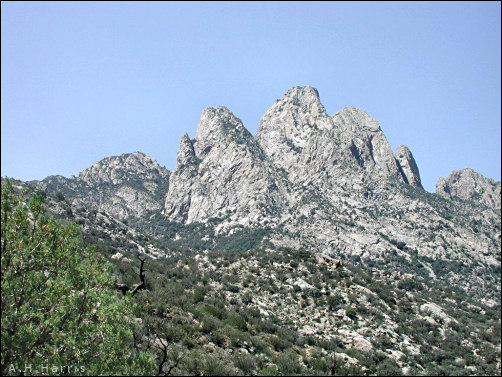

Global warming already has caused numerous biological changes. Examples include earlier migration patterns among birds, some species of fish occurring farther north than normal, and early blooming of plants. Other changes are in the offing. In many reptiles, for example, the sex of offspring is determined by the incubation temperature, not by the genetic makeup. In a number of these, such as crocodilians, higher temperatures result in skewing the sex ratio in favor of males—not the ideal way to salvage a species headed toward extinction.
In North American deserts, mountain islands rise far above the desert
floor, harboring relatively cool, moist conditions compared to the desert below. Many
of these montane areas preserve plants and animals otherwise found only far to the
north, and some have unique species found nowhere else. As temperatures climb, we can
expect the lower boundary of their ranges to retreat to higher and higher elevations
until, ultimately, they reach the highest points. Unable to retreat farther, such
plants and animals may well be doomed, and our desert region the worse for it.

Contributor: Arthur H. Harris, Laboratory for Environmental Biology, Centennial Museum, University of Texas at El Paso.
Desert Diary is a joint production of the Centennial Museum and KTEP National Public Radio at the University of Texas at El Paso.

The Organ Mountains of New Mexico rise above the Rio Grande Valley and the Hueco Bolsón, supporting plant and animal life not found in the lowlands. Photograph by A.H. Harris.
Reptile Conservation International